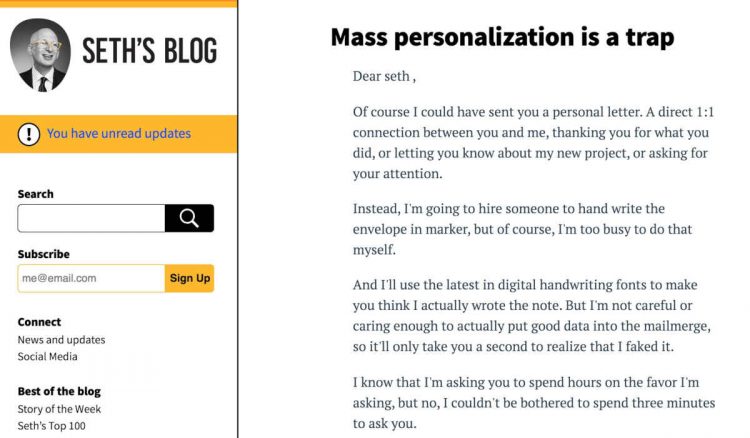Ever hear of the uncanny valley phenomenon? It’s that odd, uncomfortable feeling we get when something appears very human, but we know it’s not, like an android or an AI-powered chatbot.
In this episode of our popular Here’s Why digital marketing video series, Mark Traphagen explains why attempting to personalize your marketing at mass scale can backfire for your brand, and why a real, personal approach in marketing is now essential.
Don’t miss a single episode of Here’s Why. Click the subscribe button below to be notified via email each time a new video is published.
Resources
- Mass Personalization Is a Trap by Seth Godin
- See all of our Here’s Why Videos | Subscribe to our YouTube Channel
Transcript
Eric, I know you’re a big fan of Seth Godin’s daily posts.
Eric: Yes, Mark. I read them every day.
Mark: I love Seth’s stuff too. One recent post of his really leapt out at me though. In “Mass personalization is a trap,” Seth pointed out how easy it is to spot fake personalization–attempts at personalization of marketing done at a mass scale–and how much doing that erodes the trust of your marketing targets.

Eric: And what are some examples of mass personalization?
Mark: In his post, Seth uses outreach emails asking the receiver to do something for the sender as his example. Bad ones try to take the place of a real direct one-to-one letter coming out of an already established relationship. Often these emails have only generic statements like, “I love your content” or even make reference to things the email recipient doesn’t do.
Eric: Like, when I get an email praising me as a marketing automation guru. I think I’ve legitimate expertise in a number of areas, but that doesn’t happen to be one of them.
Mark: Right, it’s a flashing neon sign that the sender doesn’t really know you or care that much about who you are and what you do. Now, Seth points out the irony that this person is probably asking you to do something for them that will cost you hours of your valuable time, yet they couldn’t take the time to establish a personal link with you before making that request.
Eric: But email isn’t the only area where lazy mass personalization is happening, is it?
Mark: By no means. It shows up in things like one-size-fits-all content in social media posts, badly-targeted ads, ad remarketing that ignores that the customer already bought the product, automated responses without quick personal follow-up, and many other common marketing practices.
[Tweet “Personalization doesn’t scale. Find out why in this video!”]
Eric: I notice from his post title that Seth thinks that this mass personalization thing is a trap. What does he mean by that?
Mark: He says it’s because the more you do it the more you need to keep doing it. But sadly, similar to excessive pop-ups on a site and some black hat SEO techniques, mass fake personalization done at scale can produce some results. Given huge numbers, a certain number of recipients will respond to the message or offer any way it comes.
Eric: You’re burning up the trust though of the majority of your targeted audience.
Mark: Exactly, and Seth compares that to throwing the walls of your house into the fireplace to stay warm. Over time, you’ll end up colder. Burning trust through attempts at mass personalization will leave people chilled toward your brand as well.
Eric: What should we be doing instead?
Mark: This is where a hard truth comes in that many don’t want to hear because it involves more work, but I’m convinced that we must get more truly personal and relational in our marketing.
I understand that for large brands dealing with millions of customers and prospects, it’s impossible to build individual relationships with each and every one of them. Nevertheless, there are things you can do, and number one is to abandon any attempts at faking personalization at scale.
With all of the publicity over the past year about fake news and how social media and targeted ads can be used to manipulate, consumers are more wary of anything that smells like fake personalization.
On the positive side, look to build actual relationships and partnerships with both real influencers and your top customer fans that show how much you value them. And if you’re going to do social media at the enterprise level, you have to be willing to invest in staff to do real-time monitoring and response. That’s just two areas. The main thing is to ask yourself before any campaign, “If I were the recipient of this, would it make me feel truly valued, or like I was being played?”
Eric: Thanks, Mark. We’ll provide a link to Seth Godin’s post in the notes for this column. And one more thing: take a moment to hit that subscribe button so you’ll never miss another one of these “Here’s Why” videos.
Don’t miss a single episode of Here’s Why. Click the subscribe button below to be notified via email each time a new video is published.
See all of our Here’s Why Videos | Subscribe to our YouTube Channel

Excellent read guys! Personalization has become the need of businesses nowadays. It is very important for businesses to know who are their customers and what they are demanding from them. So, they can provide more personalized services and products to customers.
Elena
I suppose a lot of it is that people hate being lied to or manipulated, and those examples are pretty blantent.
It reminds me of the companies who try to be “cool” and appeal to younger audiences, but it’s just incredibly cringy because everyone involved is so out of touch.